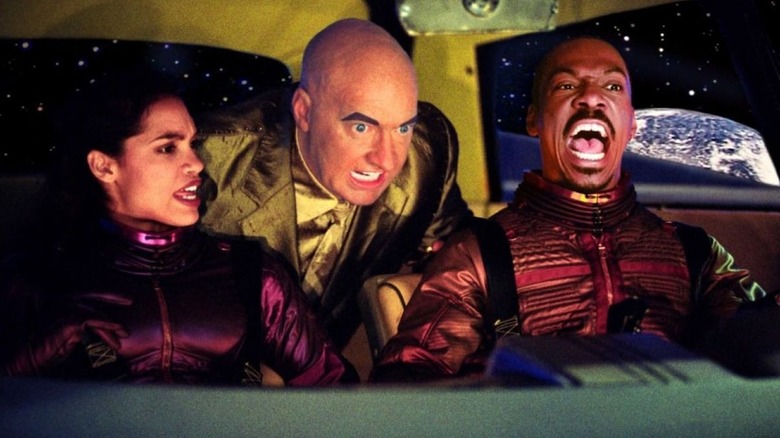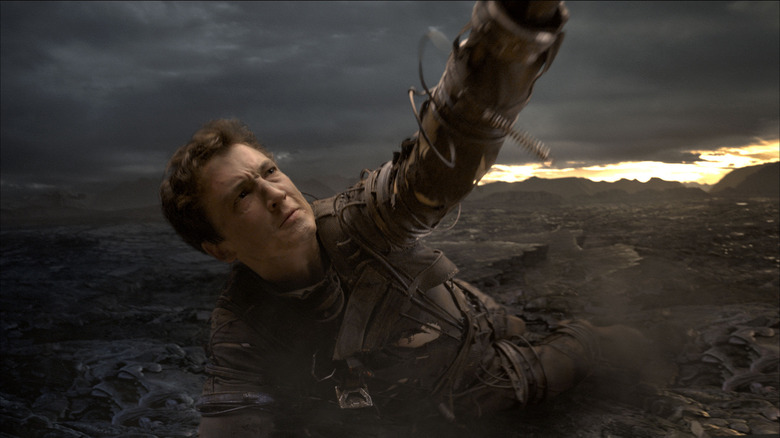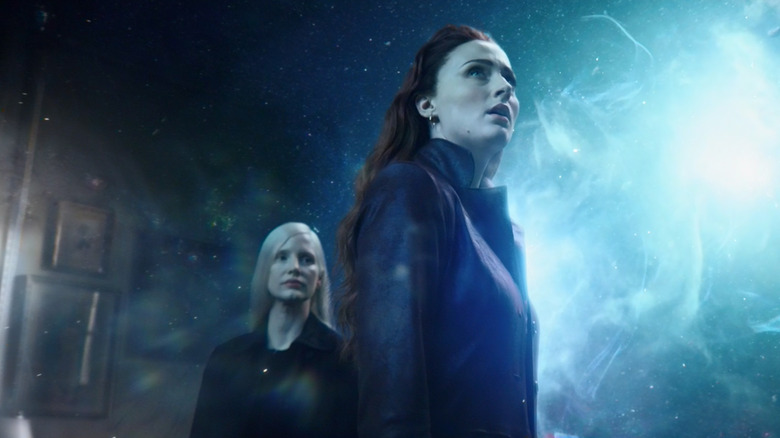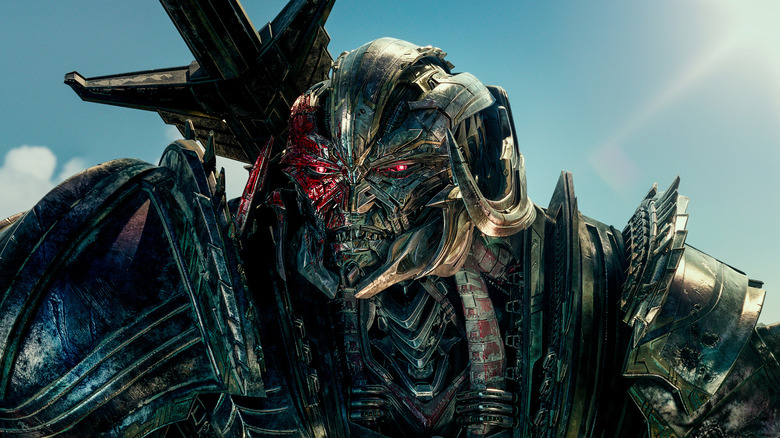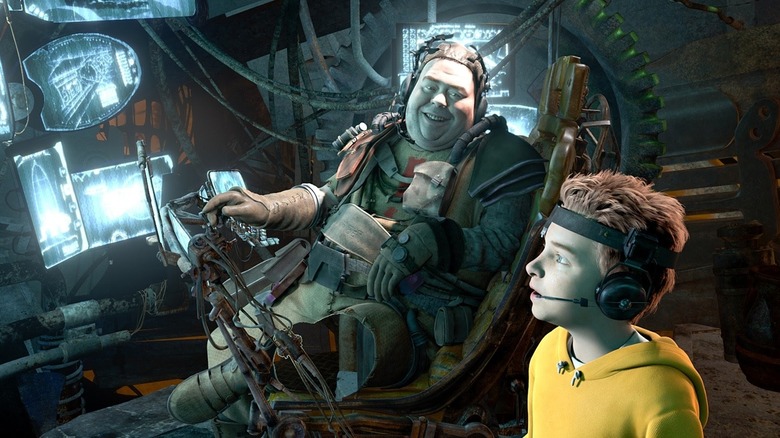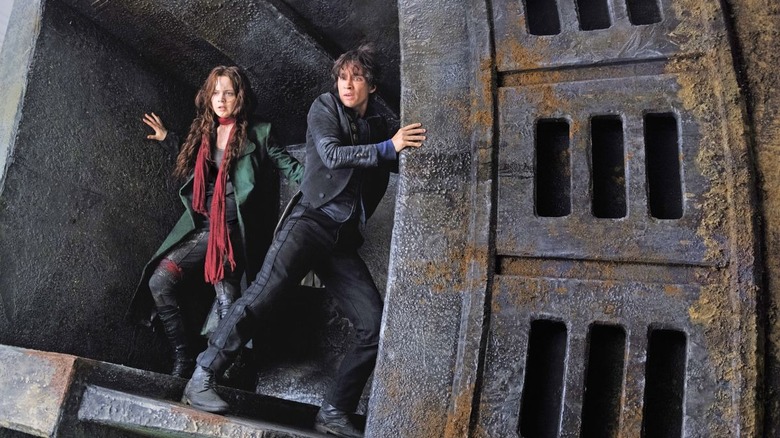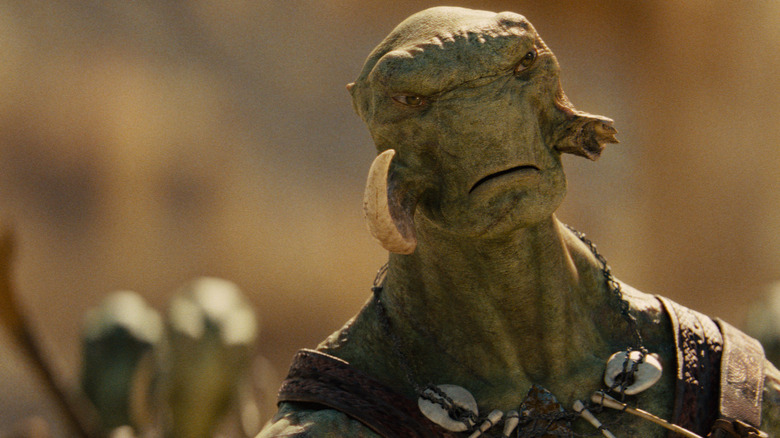The Most Expensive Sci-Fi Flops In History
The world of science fiction cinema has produced some of the most lucrative box office hits in history. Just in the realm of modern box office feats alone, the biggest feature of all time at the worldwide box office is "Avatar" while the largest title in North America is "Star Wars: The Force Awakens." Both features are drastically different in many ways, but they're both projects emanating from science fiction storytelling. At its best, sci-fi storytelling can provide glorious escapism and visually dynamic visions of planets we could only dream of. They can also offer a glimpse into deeply relatable struggles, using heightened storytelling to tap into discernibly authentic situations. Science fiction cinema can be something that shatters box office records, but there are also entries in the genre that have gone in the complete opposite direction financially.
The most expensive science fiction flops in history, recognized by how much money they're estimated to have lost at the worldwide box office, are the antithesis to something like "Avatar," serving as projects that resonated with few and often garnered reviews chastising them as lousy examples of sci-fi storytelling. The box office runs of each of these titles were impacted by unique factors, as no one entity informs all box office duds. However, all these sci-fi titles that lost exorbitant amounts of cash were united in serving as vivid and tragic examples that the science fiction genre is far from bulletproof at the box office.
The Adventures of Pluto Nash (2002)
You wouldn't normally associate comedies with massive budgets, but titles like "Evan Almighty" show that entries in this genre can rack up budgets comparable to your average Marvel movie. "The Adventures of Pluto Nash," a 2002 sci-fi comedy starring Eddie Murphy, wasn't quite that costly but it still had a sizable $100 million budget. Up to this point in his career, Murphy hadn't appeared in a live-action movie that exceeded $317 million worldwide. That meant "Pluto Nash" needed to be an abnormally lucrative star vehicle to justify that enormous budget.
Unfortunately, "Pluto Nash" came nowhere close to being profitable. Instead, it was a legendary box office flop that grossed only $7 million worldwide, including a paltry $4.4 million in North America. CBS News would later report that this title lost a gigantic $92.9 million. Opening in just 2,320 theaters in its domestic opening weekend, compared to the 3,243 locations "Nutty Professor II: The Klumps" premiered in just two years earlier, it's clear Warner Bros. didn't have much confidence in "Pluto Nash" finding an audience. The dismal reviews for "Pluto Nash" seemed to justify that nonexistent conviction in its box office prospects. Still, even the most pessimistic individuals could've never imagined that "Pluto Nash" would rack up box office losses largely unheard of for a comedy.
Final Fantasy: The Spirits Within (2001)
High expectations were riding on the computer-animated sci-fi action film "Final Fantasy: The Spirits Within." Specifically, the feature was seen as a potentially groundbreaking title for the domain of ultra-realistic computer graphics in cinematic narratives. In an article from Animation World Network, VFX supervisor Remo Balcells provided detailed explanations for the various technological revolutions that the production provided. This included the way the film's animators rendered entities like fire or explosions. While all of this was exciting for animation aficionados, a pricey tentpole cannot become a box office hit by VFX breakthroughs alone. The eventual box office haul of "Final Fantasy: The Spirits Within" would reflect this brutally.
In its worldwide box office run, "Final Fantasy: The Spirits Within" grossed just $85.1 million, a disastrous sum given its $137 cost. That budget was part of the problem here, as "The Spirits Within" was too expensive for a non-sequel animated feature. For comparison's sake, "The Spirits Within" cost a little over 50% more than the $90 million budget of "Atlantis: The Lost Empire" from that same summer. Spending this much cash on the project was almost certainly always going to be a mistake. However, the financial woes of "The Spirits Within" were even worse than anyone could've anticipated since it lost $94 million. Needless to say, "Final Fantasy: The Spirits Within" did not meet those lofty pre-release expectations.
Stealth (2005)
"Stealth" was inarguably the biggest killer jet movie of summer 2005. It also was one of Jamie Foxx's first movies after winning an Oscar for the feature "Ray," further enhancing the high-profile nature of this motion picture. However, "Stealth" ended up cratering at the box office and even became one of the biggest box office duds of 2005. Grossing just $76.4 million globally on a $138 million budget, "Stealth" was a catastrophe at the box office. The promise of a jet gaining sentience and going on a rampage just wasn't something people were lining up to see in the summer of 2005.
Part of the problem with "Stealth" was its exorbitant budget. That $138 million price tag meant this film had to perform abnormally high for a blockbuster not based on any pre-existing source material to be profitable. It didn't help that, while Foxx was an Oscar winner, the other two leads of the film (Jessica Biel and Josh Lucas) did not have extensive experience anchoring big blockbusters. With all these flaws dragging down the box office run of "Stealth," it's no wonder the film ended up losing (per the book "The 10 Worst of Everything: The Big Book of Bad" by Sam Jordison) a whopping $96 million for Sony/Columbia.
Fantastic Four (2015)
The 2015 "Fantastic Four" movie was supposed to relaunch this franchise in style. This was to be a grim and gritty take on the famous Marvel superhero team that could eventually spawn sequels, crossovers, and whatever else 20th Century Fox could imagine. That all changed once the box office results for this feature came in. The abysmal $167.8 million worldwide gross of this "Fantastic Four" was a cold splash of water in the face of all those expectations that this title could spawn a long-term franchise. A terrible sum under any circumstances, this was an especially bad gross when compared to the worldwide totals of the preceding two "Fantastic Four" movies. Coming in 50% behind the global haul of the 2005 "Fantastic Four" installment was not what 20th Century Fox had in mind when it greenlit this reboot.
A lot was going on to make audiences wary of shelling out cash for this version of the Fantastic Four, but what really sank this one was director Josh Trank disowning the film just hours before its August 7 release. It was a rare event that grabbed headlines and immediately gave the film a toxic reputation. Estimated to have lost somewhere between $80 and $100 million for 20th Century Fox, the ambitions of this "Fantastic Four" film becoming a pop culture phenomenon were quickly snuffed out.
Dark Phoenix (2019)
Some long-running franchises go out with a bang, a thrilling last hurrah that cements them as having left a lasting impact on pop culture. Sadly, such a fate did not befall the original "X-Men" series from 20th Century Fox. While the original film was an important title in the history of Marvel Comics film adaptations, the closing chapter of the saga, "Dark Phoenix," proved only significant in its box office doldrums. In its worldwide box office run, "Dark Phoenix" grossed just $246.3 million on a staggering $200 million budget, including an abysmal $65.8 million domestic total that barely exceeded the North American opening weekend of "X-Men: Apocalypse."
To put those numbers in perspective, "Dark Phoenix" didn't just fall short of the $746 million haul of "X-Men: Days of Future Past" from five years earlier. It also came in beneath the $296 million global cume of the very first "X-Men" from the year 2000. Among all "X-Men" titles, only "The New Mutants" did worse at the worldwide box office. The finaqncial shortcomings of this title were so severe that "Dark Phoenix" eventually lost $93 million. Embracing more overtly sci-fi elements for this final installment of the original "X-Men" series couldn't prevent "Dark Phoenix" from being a massive dud.
Jupiter Ascending (2015)
Lana and Lilly Wachowski changed science fiction cinema forever with "The Matrix," that rare American blockbuster with intellect to spare that still managed to crush it at the box office. While the two "Matrix" sequels had varying degrees of success at the worldwide box office, the duo struggled to parlay that kind of financial glory into other non-"Matrix" sci-fi blockbusters. Rarely was this struggle more apparent than on their 2015 feature "Jupiter Ascending," which had a reported production budget of $179 million.
The sizable budget was needed to cover the expansive scope of this title as well as secure major talent in the lead roles like Mila Kunis and Channing Tatum. Unfortunately, spending all that dough didn't end up attracting scores of moviegoers. Grossing just $181.9 million worldwide, including a dismal $47.4 million in North America, "Jupiter Ascending" came in way behind expectations. While it at least made more globally than the $93.3 million haul of 2008's Wachowski Sister box office dud "Speed Racer," "Jupiter Ascending" was otherwise a financial disaster. This was exemplified by how it eventually lost $95.7 million, a sharp contrast to the days of the Wachowski Sisters printing money with their original "Matrix" films. The only comfort for this directorial duo here is that, unlike some other all-time sci-fi money losers such as "Battleship," "Jupiter Ascending" has developed a cult following, albeit not nearly a big enough following to render the feature profitable.
Titan A.E. (2000)
20th Century Fox's attempt to launch an animation studio in response to the wild success of "The Lion King" and other 1990s titles ended in spectacular disaster with "Titan A.E." Only the second project to emerge from Fox Animation Studios, "Titan A.E." was a massive sci-fi adventure film full of explosions, aliens, and spaceships. It was the kind of movie channeling "Star Wars" more than it was "Beauty and the Beast." Costing a pricey $75 million to make, the pressure was on the movie to make enough money to ensure that Fox Animation Studios could keep on trucking.
Unfortunately, "Titan A.E." only made $36.7 million at the worldwide box office, which included a meager $22.7 million in North America. Former Fox Animation Studios head Chris Meledandri noted in a 2013 profile for Bloomberg that "Titan A.E." ended up being such a flop that it cost Fox $100 million. Within days of the "Titan A.E." opening, Fox Animation Studios was shut down. Even worse, this film's box office failure ended up serving as an ominous precursor to the financial turmoil that would befall other early 2000s hand-drawn animated films heavy on sci-fi action, such as "Atlantis: The Lost Empire" and "Treasure Planet."
Transformers: The Last Knight (2017)
For years, the "Transformers" movies were financially bulletproof. The live-action stories of robots that fight each other and turn into vehicles were reliable generators of massive box office hauls. As late as "Transformers: Age of Extinction" in 2014, the series could still exceed $1 billion and top all other titles at that year's worldwide box office. Unfortunately, the good financial luck for this saga came to a close with "Transformers: The Last Knight," a 2017 installment that saw Optimus Prime going bad and the mythology of King Arthur getting swirled up in all the robot mayhem. These fresh ingredients weren't enough to stave off financial misery for "The Last Knight."
While many movies would be pleased as punch with a $602.8 million worldwide gross, "The Last Knight" made less than all prior "Transformers" movies. This occurred even as the movie cost anywhere from $217 to $260 million to produce, a noticeable increase from the budgets of earlier "Transformers" entries. With such a gargantuan budget, it would've taken far more than just $602.8 million globally to make this one profitable. Per the head of CBSViacom, The Last Knight" ended up losing an excess of $100+ million for Paramount Pictures. An official figure for its losses was never disclosed, but that kind of financial bleeding would've been incomprehensible in the past for a series that seemed to be printing money. However, even the most lucrative sci-fi sagas can end up producing a box office dud for the ages.
Mars Needs Moms (2011)
Over the years, movies with Mars in the title or their plot have not fared so well at the box office. This is obviously not a concrete rule given that movies like "The Martian" and the original "Total Recall" were major hits. Plus, flops based around the red planet like "Mission to Mars" had many other problems working against them. However, the constant financial troubles that have plagued Mars-centric films have certainly done no favor to the reception of such titles. The tremendous box office failure of "Mars Needs Moms" did nothing to dissuade any potential jitters over the financial viability of movies set on Mars.
Released in March 2011, "Mars Needs Moms" debuted in a month that's often been kind to animated family fare. "Mars Needs Moms" was a significant exception to this trend, grossing just $39.5 million globally. That was a disastrous sum given its $150 million budget. Competition from other animated family movies, such as "Rango" or fellow Disney title "Gnomeo and Juliet," helped keep audiences always from "Moms." The divisive nature of the film's motion-capture animation technique also did it no favors. There was a lot more going on with this movie losing around $100 million than just it being set on Mars.
Tomorrowland (2015)
"There's a great big beautiful tomorrow," harmonizes the Carousel of Progress at various Disney theme parks. Unfortunately, there was not a great big beautiful box office haul awaiting "Tomorrowland," a 2015 Brad Bird directorial effort that took inspiration from the Disney theme park land of the same name. Costing $190 million, "Tomorrowland" was a big swing from Bird and screenwriter Damon Lindelof to try and launch a largely original tentpole into the summertime marketplace. Plus, it was a big test to see if Bird could deliver a live-action hit separated from the "Mission: Impossible" saga.
Unfortunately for all involved, "Tomorrowland" came up woefully short on all expectations. Grossing just $206 million worldwide, "Tomorrowland" came nowhere close to being profitable. Even worse, it was way below the worldwide box office hauls of other Brad Bird movies. It would be tempting to lay the $120-150 million losses of "Tomorrowland" strictly at the feet of it being an original movie. However, there were deeper problems here informing the feature's financial struggles, including competition from other summer 2015 titles like "Avengers: Age of Ultron" and "Jurassic World." Plus, exempting "Gravity," "Tomorrowland" leading man George Clooney had never appeared in a movie that grossed enough globally to justify a $190 million budget. He was famous for being in mid-budget dramatic hits, not costly blockbusters. This and several other factors collided to cement the dismal box office outcome for "Tomorrowland."
Terminator: Dark Fate (2019)
The hope with "Terminator: Dark Fate" was to finally get the "Terminator" series back on track. The franchise had been dragged down by a trio of sequels that never quite resonated with the public nor broke through as much as they could've financially. "Dark Fate" attempted to give die-hard fans exactly what they wanted, with James Cameron back for the first time since "T2: Judgement Day," this time as a producer. Linda Hamilton also reprised her role as Sarah Conner. Plus, unlike the last three "Terminator" movies that solely focused on familiar characters like John Connor, this new installment would largely fixate on brand-new individuals in an attempt to attract a new generation of moviegoers.
The audaciousness of this attempt to revive the "Terminator" brand was even reflected in its massive $185 million budget, with all those dollars going towards ensuring that this feature could live up to the kind of massive spectacle "T2" delivered decades earlier. Unfortunately, all these efforts didn't lure in moviegoers, as "Dark Fate" ended up making only $250.3 million worldwide, the vast majority of which came from its international run. After so many underwhelming "Terminator" movies, not even the return of Cameron and Hamilton could get moviegoers back on board with this series. The result of all this was not only the lowest global haul for a "Terminator" sequel but also a massive $122.6 million loss. With that, this franchise was officially terminated.
Battleship (2012)
In "Battleship," human beings managed to defeat the odds and stave off an alien invasion of the planet Earth. It's a classic underdog story, the kind that has defined so many beloved hit blockbusters. In real life, though, there was no happy ending in store for the box office run of "Battleship." This film adaptation of the beloved board game was a massive flop at the worldwide box office, grossing just over $313.4 million globally, including just $65.2 million from North America. That was a less than ideal haul for a summer blockbuster under any circumstance, but it was especially disappointing considering that "Battleship" cost a hefty $220 million to make.
The underwhelming aspects of "Battleship's" box office failings were endless, as were the reasons it came up short financially. While reflecting on the film to The New York Times, director Peter Berg noted that the biggest reason for "Battleship" flopping was that it lacked a movie star to draw in moviegoers. His earlier blockbuster "Hancock" was anchored by box office juggernaut Will Smith, while "Battleship" was relying on the spectacle of intergalactic aquatic warfare to grab people's attention. Betting on that element did not pay off for "Battleship's" financial prospects. Having lost a projected $150 million, "Battleship" sank without a trace at the box office.
Mortal Engines (2018)
Universal Pictures tried its best to pump up "Mortal Engines" as the next big hit blockbuster. A steampunk adventure full of sci-fi elements like an undead cyborg warrior and giant moving cities, "Mortal Engines" was given a cushy mid-December launchpad, the same timeframe producer Peter Jackson debuted his "Lord of the Rings" movies to great success. The studio even started advertising "Mortal Engines" a whole year in advance to help pump up its profile and put the title on the radar of moviegoers across the globe. Even with all these measures, though, audiences just didn't care for "Mortal Engines" and outright rejected the project despite the presence of Jackson.
"Mortal Engines" crashed and burned at the worldwide box office with $85.4 million, including a tiny $15.9 million in North America. While mid-December had been a great place to premiere the "Lord of the Rings" and "Hobbit" movies, "Mortal Engine's" home of December 2018 turned out to be disastrous thanks to competition from titles like "Aquaman" and "Bumblebee." Even worse, the relative obscurity of the source material compared to "Lord of the Rings" meant there just wasn't a massive fanbase or level of curiosity to see how this adaptation turned out. "Mortal Engines" ended up sputtering out so bad that it lost $174.8 million for all of its financiers.
John Carter (2012)
It feels almost unfair to once again belabor the financial shortcomings of "John Carter." The titular lead of this Andrew Stanton blockbuster was once synonymous with some of the most popular sci-fi novels on the planet. Now, thanks to this 2012 film's dismal box office run, "John Carter" is largely associated with one of the costliest misfires in the history of Hollywood. It's hard to imagine an outcome where "John Carter" managed to become profitable, though, given its enormous $263.7 million budget. That was a price tag that made "John Carter" more expensive than 2012 sequels like "The Avengers" and "The Dark Knight Rises."
Even if "John Carter" was likely doomed to be unprofitable, it was never expected to perform as badly as it did. Grossing only $282.7 million worldwide, "John Carter" managed to come in behind the global grosses of other notorious box office bombs of the same era like "Prince of Persia: The Sands of Time" and "Battleship." The sheer magnitude of "John Carter's" box office shortcomings was made clear shortly into its theatrical run once The Los Angeles Times reported the film would lose Disney $200 million. That was the kind of enormous loss that would stand out in all genres of cinema, let alone just among sci-fi films.

